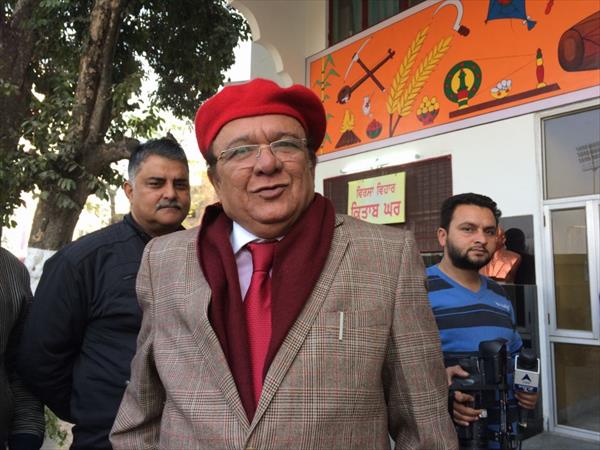Note: This article was originally published by Daily Kashmir Image
By Rashmi Talwar

Amritsar, Dec 18: In better times, one would see Pakistanis in Amritsar shopping or savoring culinary delicacies the city is famous for – something that Indians would do when in Lahore. But it is no longer so now!
“Talk of ‘Aman’ or peace, and you face a bullet on our side (Pakistan); at your side (India), they blacken faces (‘Aman bolo, te sade pase goli; tuhade pase muh kaala!),” Imtiaz Alam, secretary general of South Asian Free Media Association (SAFMA) said today, and then went on to ask if the Indian audiences would thus blacken his face if he talks peace with India.
After crossing the cumbersome Radcliff line between India and Pakistan from the Wagah Attari JCP to address a ‘Peace Seminar’ organized here, columnist, analyst and senior Pakistani journalist Imtiaz Alam was equally scathing for his co-professionals as well.
Castigating media in no uncertain terms, Alam said the public of both countries has become hostage to extremism, hate-mongers, jingoism and war-mongering, beemed out by TV channels.
“Pardon me for the expletive, but it is ‘Kutkhana’ (dog-fight) on televisions of both sides,” he burst out, adding that the media on both sides “is on a hate wave” and even a normal or kind gesture evokes hatred.
“If Pakistan and India stick to their respective stances, where is the meeting point for a dialogue?” he asked.
In the past years, he said when people-to-people exchange was going on, “we were inches close to resolving issues and tracking on the new path to peace, prosperity and progress.”
But then, as history has it, even a single spark can unmake the loving nest that doves on both sides had build with tiny straws over the years!
“Do you have any example of nuclear-powered countries issuing threats the way the nuclear subcontinent is …? In Pakistan the jingoism has risen to a level where hawks say ‘we will bomb all cities of India’, and in India, they say ‘you may destroy a few lakhs, but we shall wipe you out and there would be none left to cry or bury you.’
“The kind of madness we have reached in 70 years has no example in the entire world and we continue with our historical blunders without learning any lessons,” Alam regretted.
The SAFMA secretary general said India and Pakistan take one step forward and ten steps backward and there is ‘KalaKali’ or black everywhere.
He said people in Pakistan are waiting for the vital Uttar Pradesh elections to end, anticipating that it’ll slowdown the high decibel Indian jingoism against Pakistan. And in India, people are waiting for Pakistan PM Nawaz Sharif to show some strength of purpose to resolve issues with India.
Alam said an impromptu gesture by the Indian PM Narendra Modi to visit Lahore in December 2015 to wish the Sharif ‘Happy Birthday’ is being used as a stick by the opposition to beat the ruling party, especially Nawaz Sharif with high-pitched slogans – “Modi ke yaar Nawaz ko dhakaa doo (Kick out Modi’s friend Nawaz) and ‘Modi ke yarr, Gadaar, Gadaar ! (Modi’s friend is a traitor!)”
Appealing to both India and Pakistan to rise against extremism, repression and minority-bashing and stand for greater human solidarity, Alam proposed a slew of measures.
“There needs to be a ban on war-mongering on TV, media should exercise restraint, and be cautious not to push the two nuclear-powered countries to war.”
He urged for a new agreement on ceasefire between the two countries and an end to proxy wars on either side.
Alam said that it is strange that “core” has become the present lingo between both the countries. “Well, you bring your ‘core’ issues and we bring our own ‘core’ issues viz-a-viz, water, terrorism, Kashmir, etc., and let’s sit and start the process of talks,” he stressed.
He also proposed to formalize a no-war pact and security cooperation by all South Asian countries, drafting of a new treaty on ceasefire, a treaty on nuclear restraint, and joint consensus on peace and security in addition to setting up a joint mechanism to fight terrorism. He also urged for bilateral pacts between military to military and other agencies for intelligence sharing.
During the proceedings of seminar, an interesting suggestion was put forth — about holding “peace talks under shady trees in the villages”, where “doves are actually hiding”. And also because here resides the major public that makes a marked political difference to the make-up of governments in both countries!





